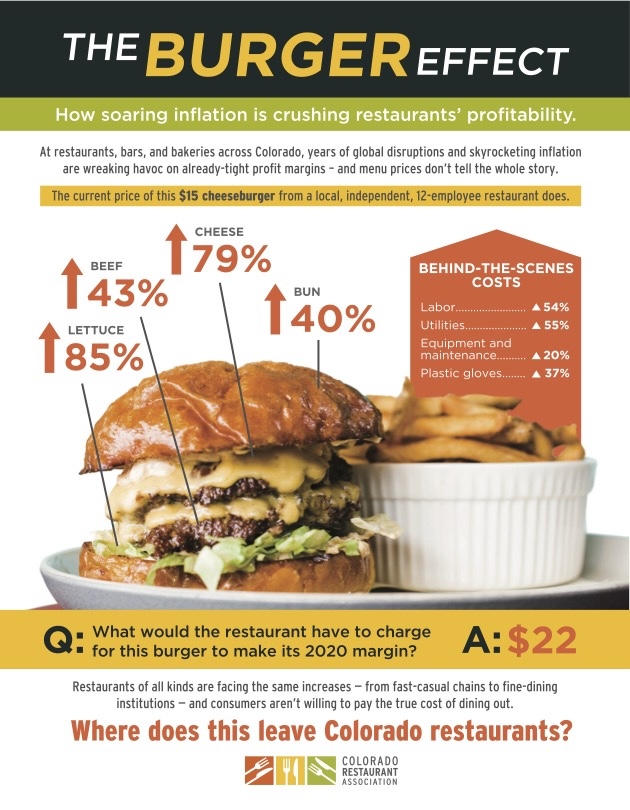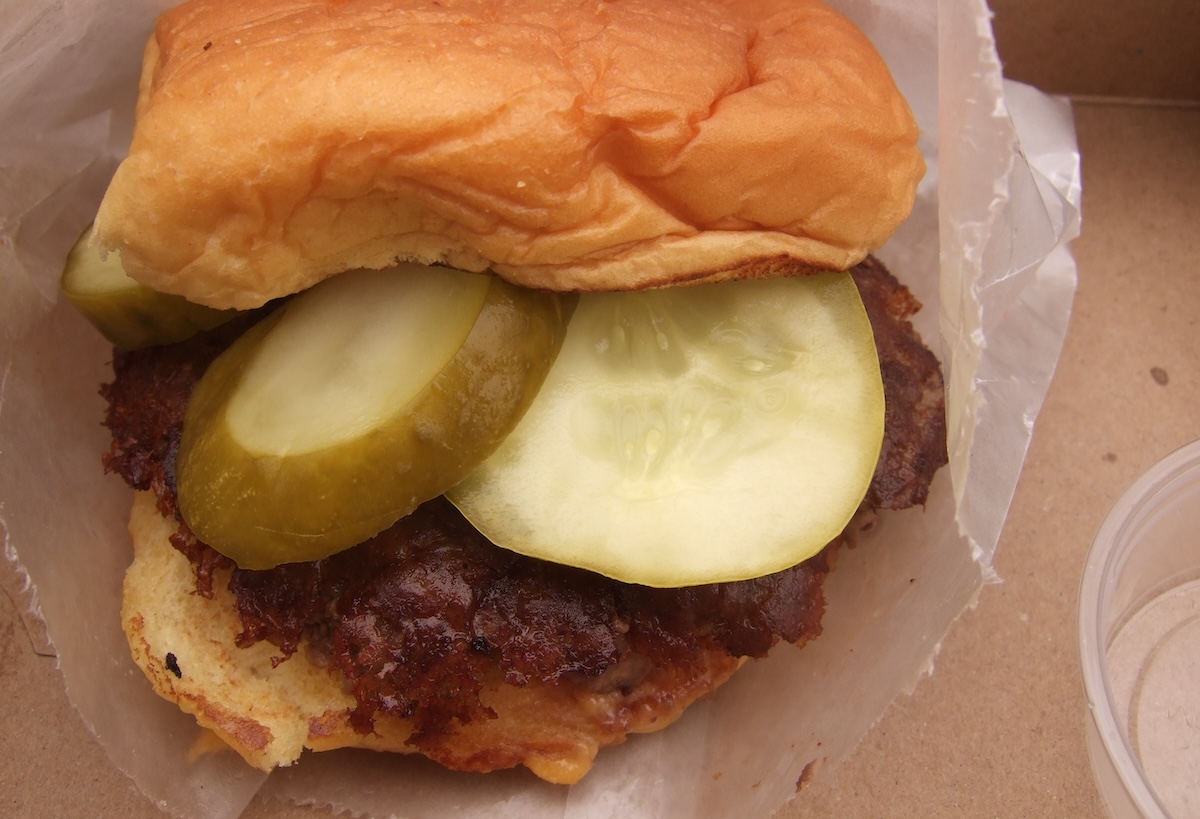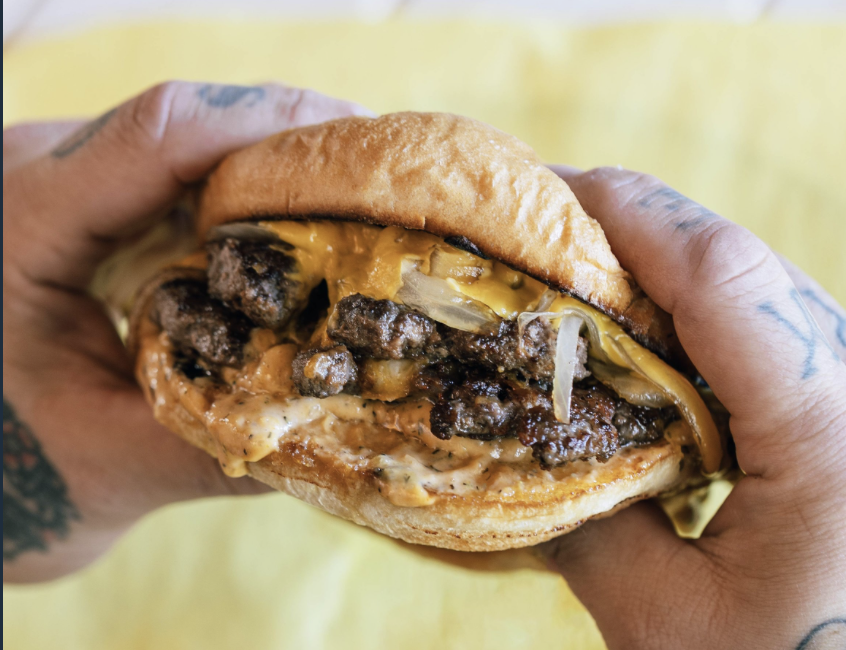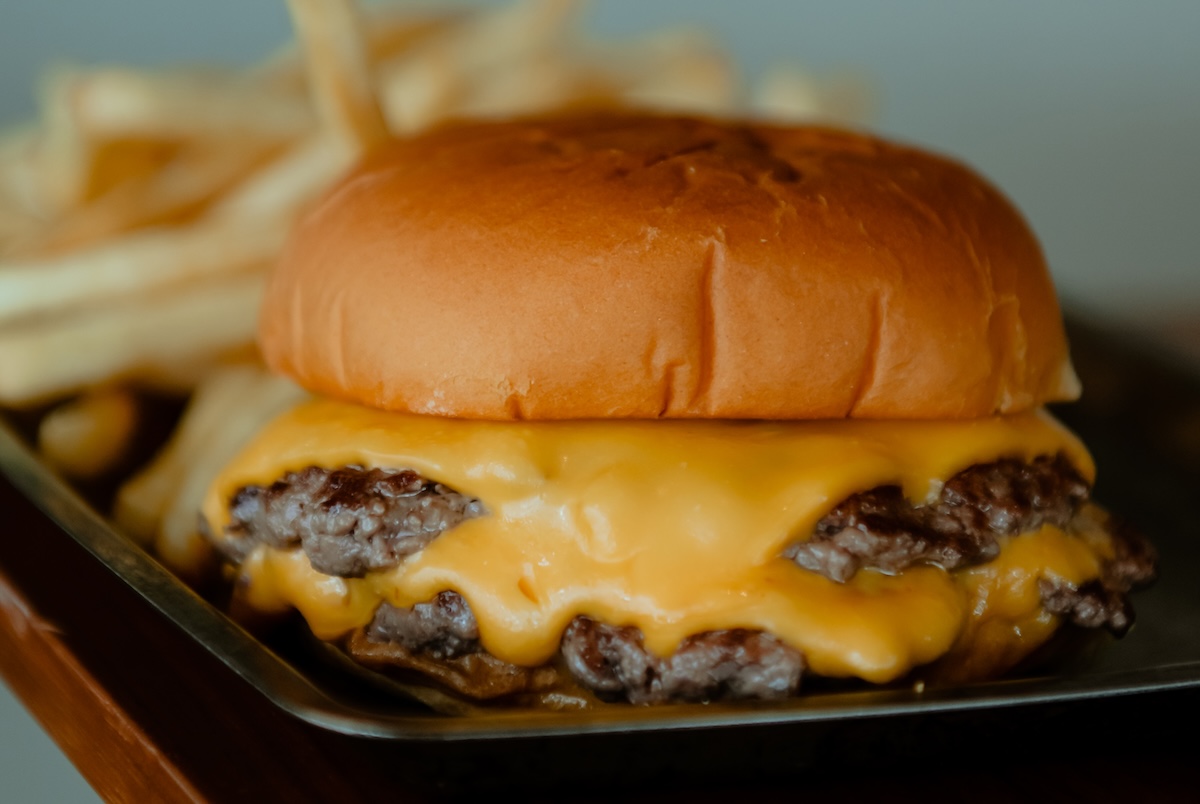While some of us remember the days when a $10 burger felt fancy and gourmet, nowadays simple cheeseburgers run closer to $15. Or more.
“The cost of just about everything it takes to run a restaurant has gone up, way up, over the past few years,” said Denise Mickelsen, communication director for the Colorado Restaurant Association (CRA). “Before the pandemic, restaurants earned an average of 3- to 5-percent profit in a good year. Now, they’re happy if they make any profit at all thanks to higher costs for labor, food, alcohol, supplies, and real estate. It’s no wonder menu prices are rising.”
The CRA broke down the cost of a $15 cheeseburger from a 12-employee, local, and independent restaurant. Turns out the burger should really cost closer to $22 if the venue hopes to make the same profit margins it did in 2020. That’s how much the price of food, labor, utilities, and rents has changed the bottom line.
The burger used in CRA’s graphic came from Fox Run Café, chef Lucien Reichert’s City Park eatery. The image was created in 2022. Now, a scant two years later the burger costs $16, which still doesn’t hit the recommended $22. The Fox Run burger consists of two smashed patties, American cheese, iceberg lettuce, pickles, and special sauce, and comes on a house-baked bun. Other changes, now the burger comes with slaw or potato chips for $16. Fries are an additional $5 as a side.
While diners also feel the pinch of inflation, the $15, $17, and even $22 burgers are here to stay, and for a good reason.
“What else is a business owner to do?” asked Mickelsen, regarding the rising costs diners are seeing on menus.

How Chefs Price Food
“The first step is to have a goal, and the first thing we do is decide on food cost,” said chef Carried Baird of Fox & Hen, who reversed engineered the cost from there.
She also works with the “X factor,” a number derived from all the little things that help make that burger. For example, the ketchup on the table, salt, pepper, the oil to cook the meat in, and hot sauce.
“You take all of that, look at the food cost goal, which generically is at 23-percent, and from there you know what you have to charge to break even,” she said. “But you haven’t even considered rent, utilities, labor costs, the dishwasher, the chemicals in the dishwasher, or the water.”
That’s why, she added, a burger that might cost the restaurant $11 to produce costs $13.50 on the menu (an example, not the actual price of her burger). Restaurants aren’t making a ton of money, and the more you pay should be reflected in the quality of ingredients. It’s much cheaper to make a fatty and gristly burger with cheap meat on a chemical-filled bun than it is to create one with thoughtfully-sourced beef, fresh bread, and flavorful produce.

“People think you’re lining your pockets when you raise prices, but you’re not,” added Juan Pedro, co-founder of the Culinary Creative restaurant group that owns Fox & the Hen, the Tap & Burger locations, A5, Ash’kara, and other bars and eateries in town. “Rent rises, Xcel rises, the city has hidden costs like you can’t get certain permits, these are the things that are really hurting restaurants.”
So how is the Fox & the Hen burger still below the cost margin? The food cost goal lowers and the restaurant losses money in order to get customers that $18 cheeseburger.
The Impact of Inflation
Looking at the cheeseburger graphic, it’s clear a lot has changed. In 2022 there was an 85-percent increase in lettuce. Cheese came in slightly lower with a 79-percent increase. Bread rised to 40-percent, and beef at 43-percent. These costs continue to grow, making it hard for most independent restaurants to charge even a paltry $15 for that simple burger.
The unseen costs have also creeped up. At the beginning of 2024, the Colorado hourly minimum wage went to $14.42 an hour, up from $13.65. For tipped employees it’s at $11.40, up from $10.63. In Denver, it’s even higher at $18.29, and $15.27 for tipped workers. In 2022, when the burgerinfographic was made, Denver’s minimum wage was $15.87, with tipped workers earning $12.85 per hour.
It’s not that employees don’t deserve a living wage, but at a 54-percent increase to the overhead, it’s a lot to swallow. Even simple things such as plastic gloves used to handle food have increased almost 40-percent. All these things added together have hit restaurants hard.

These Burgers are Worthy
Now more than ever it’s time to put your money where your mouth is and support independent restaurants serving those burgers you love. The better it tastes and makes you feel, the more money it takes to get those ingredients.
One of the best around is the Double Bodega Burger at Bodega in Sunnyside. It costs $15 and includes a double smashed patty, two types of cheese, pickled green beans, sauce and potato brioche. No side comes with it, and if the diner wants green chilies, bacon, or an egg, it will run $1 to $2.50 more.
At Mercantile in Union Station, the Kewpie Burger comes in at $20.20 and features American cheese, caramelized onion, dill pickles, lettuce, Kewpie sauce, and a sesame bun baked by the company’s bakery, Füdmill.
Nearby at Stoic & Genuine, which also pays rent to Union Station, the CAB Double Cheeseburger is $19.75. It includes lettuce, tomato, cheese, and fries. Le French charges $19 for its burger too. Dubbed Notre Burger, the dish comes with grass-fed beef, caramelized onion, and choice of cheese on a brioche bun.

Burgers On the Cheap
Of course it is possible to get a solid burger for under $15, though these places often have multiple locations. By having more ordering power due to larger needs, ingredients tend to cost less. For example, Park Burger has four locations. Its average, single patty cheeseburger comes out at $11.50, and the double is $14.25. At Atomic Cowboy’s Fat Sully‘s, its lauded burger costs $10.95 for a double patty with cheese, house-made pickles, minced onion, and burger sauce on a garlic-butter brioche bun. Atomic Cowboy boasts seven Colorado locations, and two in Kansas City.
Head to Split Lip inside Number Thirty Eight. Here the Slug Burger with American cheese, sauce and pickles runs $14 and comes with fries. A traditional slugburger is small, and is made with a mixture of meats and a cheaper non-meat filler, usually soy. While delicious, this technique and the fact Split Lip doesn’t run its own storefront help lower the cost of food.
Lucy’s Burger Bar also sells the basic, single patty cheeseburger for just $10, sans sides. If you want the signature Juicy Lucy with the cheese cooked inside, the cost runs $15. A double cheeseburger is $16. Finally, at CBurger, Half Eaten Cookie Hospitality‘s regenerative beef burger shop, a simple double cheeseburger solo tops at $9.50. Founder Bryan Dayton knows the cost is low for such quality meat. But while the concept loses money right now, he hopes with popularity and growth the margins will shift.
No matter how or where you get that burger fix, remember costs reflect not only the ingredients used to make a cheeseburger, but the labor, rent, utilities, and other unseen costs. Enjoy with gratitude that in this life, we get to have some of the best burgers around, and can choose where we go to find them.

